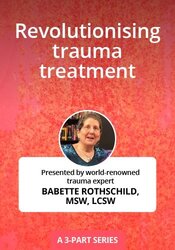

It’s an open secret among therapists that the road to recovery from trauma can be long and fraught with clinical missteps.
Clinicians with decades of clinical practice are often left dumbfounded by the lack of progress their clients struggling with traumatic memories are making...
...even when using theoretically sound, therapeutic modalities like EMDR, CBT, and other evidence-based approaches.
So, why aren’t their clients improving?
Because their clients aren’t prepared or equipped to work through their trauma.
That’s why your trauma approach needs to emphasise stabilisation, flexibility and self-awareness above all else.
Watch world-renowned trauma specialist Babette Rothschild, MSW, LCSW show you how to adapt your approach to trauma work to make it safer and easier to control and inspire more courage in your clients as they approach this daunting material.
The approach Babette has mastered is so powerful for helping trauma clients... and now she’s sharing her legacy knowledge to clinicians around the world through this incredible training.
Watch as she leads engaging discussions, shares practice exercises, and showcases video demonstrations that will give you the knowledge to help your client’s mind, brain, and nervous system recognise that trauma is behind them — whether traumatic memories are processed or not.
You’ll come away with the skills to enhance any modality of psychotherapy or counselling useful for all client populations.
PESI Australia, in collaboration with PESI in the USA, offers quality online continuing professional development events from the leaders in the field at a standard recognized by professional associations including psychology, social work, occupational therapy, alcohol and drug professionals, counselling and psychotherapy. On completion of the training, a Professional Development Certificate is issued after the individual has answered and submitted a quiz and course evaluation. This program is worth 12 hours CPD for points calculation by your association.
| File type | File name | Number of pages | |
|---|---|---|---|
| Revolutionising Trauma Treatment - Handout (0.52 MB) | 25 Pages | Available after Purchase |

Babette Rothschild, MSW, LCSW has been a practicing psychotherapist and body-psychotherapist since 1976 and a California Licensed Clinical Social Worker since 1978. She is a member of the International and European Societies for Traumatic Stress Studies, the Association of Traumatic Stress. Babette has trained extensively in Transactional Analysis, Gestalt Therapy, Psychodrama, Eye Movement Desensitization and Reprocessing and Somatic Experiencing, and is a certified Bodynamic Analyst and certified Radix Teacher. She has written extensively on trauma. Her works include 8 Keys to Safe Trauma Recovery; HELP for the HELPER: The Psychophysiology of Compassion Fatigue and Vicarious Trauma (with Marjorie Rand); THE BODY REMEMBERS: The Psychophysiology of Trauma and Trauma Treatment; THE BODY REMEMBERS CASEBOOK: Unifying Methods and Models in the Treatment of Trauma and PTSD; Trauma Essentials: The Go-to Guide.
Speaker Disclosures:
Financial: Babette Rothschild is in private practice. She receives a speaking honorarium from PESI, Inc. She has no relevant financial relationships with ineligible organizations.
Non-financial: Babette Rothschild has no relevant non-financial relationship to disclose.
Please wait ...